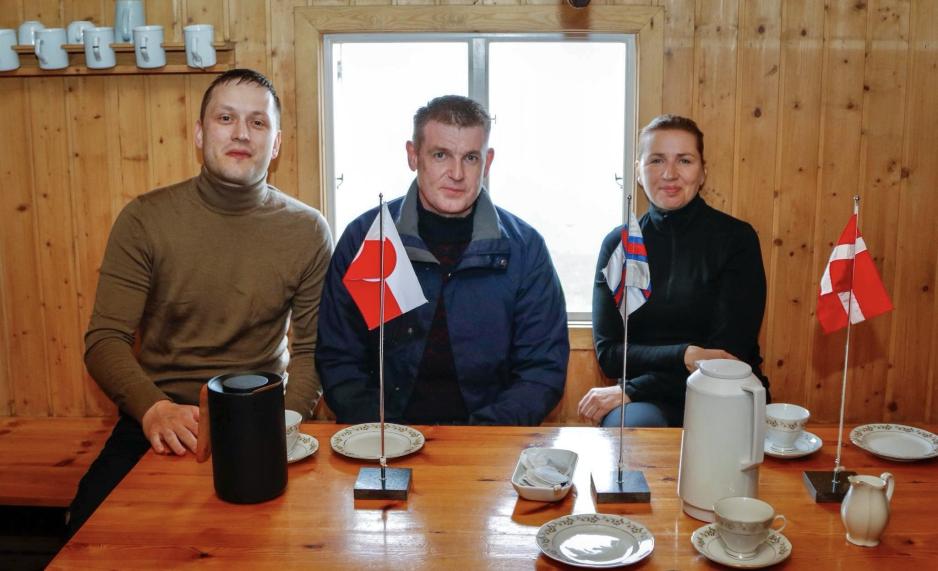Op-ed: The Evolving Concept of Arctic Exceptionalism: From Isolation to Geopolitical Leverage

Gathered for the Kingdom of Denmark's biannual meeting: Jens-Frederik Nielsen, the Greenlandic Prime Minister, the Faroese Prime Minister Aksel V. Johannesen and the Danish Prime Minister Mette Frederiksen. (Photo: Naalakkersuisut)
"Shifts in the region’s climate, along with changing geopolitical dynamics that are increasingly affecting the region, have begun to challenge the notion of Arctic Exceptionalism, with some calling it out as an illusion. To speak plainly, did we all get tricked?" asks High North Center director Andreas Raspotnik, Arctic Intitue director Romain Chuffart and Arctic Institute associate Pavel Devyatkin.
The opinions expressed here belongs to the author and do not represent the views of High North News.
The Arctic has historically been framed as an exceptional place sheltered from the complexities of global politics.
However, shifts in the region’s climate, along with changing geopolitical dynamics that are increasingly affecting the region, have begun to challenge this notion, with some calling it out as an illusion. To speak plainly, did we all get tricked?
Infatuated with the idea of Arctic peace at all costs? What once seemed exceptional about the Arctic was not its geography as such, but rather the behaviour of the states surrounding it.
This negotiated form of a peculiar regional order reflected the Arctic states' deliberate effort to compartmentalize their relations and maintain a cooperative framework in the region, distinguishing it from potentially more conflict-prone dynamics they engaged in elsewhere.
Today, however, this exceptionalism is being redefined by the strategic importance of the region in global geopolitics, particularly in the context of the current war in Ukraine or China’s rise as global power.
The war in Ukraine recalibrated global, at least the European, security architecture
As access increases and temperatures rise, the – new – exceptionalism of the Arctic is rooted in its increasing centrality to global geopolitical power. But is this assessment true or is it just the same old Arctic story?
A New Exceptionalism?
The war in Ukraine recalibrated global, at least the European, security architecture. It triggered unprecedented sanctions, shifting alliances and intensifying military postures.
The spectre of Cold War-like confrontation looms over us, with the current hourly-changing updates from the Middle East only adding to such speculations. Within these unfolding uncertainties, the Arctic finds itself in a paradox.
It is strategically central yet politically peripheral in dominant narratives of potential conflicts.
Nowhere is this more evident than in the Russian Arctic, which is both the country’s linchpin of its extractive economy, supplying vast reserves of hydrocarbons and minerals, and a foundational element of its military doctrine.
Also read (The text continues)
For example, the Northern Fleet anchors Russia’s capacity to project power across the Arctic and beyond.
Yet despite these high stakes, the Arctic remains conspicuously absent from mainstream Western analyses and strategic discussions aimed at ending the war in Ukraine.
This omission is puzzling, especially given the tangible ways in which the war has already extended into the circumpolar theatre.
For example, with Ukrainian strikes on the Olenya Airbase in Murmansk Oblast in 2024 and 2025, the idea that the geographical Arctic is somehow insulated from broader geopolitical logics appears increasingly untenable.
The persistence of this assumption, commonly referred to as Arctic exceptionalism, rests on a normative fiction that confuses geography, geopolitics, and cooperation.
We are quick to pronounce the death of exceptionalism
Arctic exceptionalism relies on a comforting but ultimately misleading narrative: one that treats the Arctic’s physical characteristics (i.e., its geography) as a guarantee of political detachment (i.e., geopolitics), and its history of limited state cooperation and scientific collaboration as evidence of enduring peace.
Then when cooperation becomes even more limited due to external factors or when geopolitics comes crashing at the Arctic’s doorstep, we are quick to pronounce the death of exceptionalism, as if it were ever a stable condition rather than a contingent performance.
But this view is increasingly outdated.
In the case of East-West relations, it is no longer a matter of whether the Arctic will be drawn into the Ukraine conflict, but how it might play a pivotal role in its resolution.
This raises two fundamental questions: how might we rearticulate an Arctic exceptionalism – a new notion of a (re-)negotiated regional order – that reflects present realities rather than idealised fictions?
Also read (the text continues)
And how might such a reimagined exceptionalism be mobilised, not to deny conflict, but to disarm it, and to position the Arctic as a vector for peace rather than as a theatre of renewed confrontation?
What is the United States’ role?
This new Arctic exceptionalism requires all hands-on deck. And the United States should play a role in leading this effort.
If a stable USA is important for NATO as much as for China and Russia, the United States has a strong interest in promoting the Arctic as a strategic space for renewed cooperation between this triumvirate of global powers.
The United States’ role as an Arctic power is rooted in a historical shift catalysed by the Russian Empire’s financial needs. In the mid-19th century, following the Crimean War, Russia found itself in need of funds and agreed to sell Alaska to the United States.
This acquisition marked the beginning of America's deepening engagement with the Arctic, but certainly not the end.
The Arctic as a critical zone for both conflict and cooperation
Given this history, the U.S. has a vested interest in the Arctic for economic reasons as much as strategic ones. During the Cold War, the Arctic became a frontline in the nuclear standoff between the U.S. and the Soviet Union.
Today, the melting ice and the growing presence of Russia/China in the region could once again position the Arctic as a critical zone for both conflict and cooperation. Could the Arctic once again be a key to peace, particularly with regard to the war in Ukraine?
A potential answer may lie in leveraging Arctic security to help broker a peaceful resolution to the conflict. For instance, the Arctic could provide a neutral ground for dialogue between Russia and Western powers, particularly the U.S. and NATO.
Given Russia’s strategic interest in maintaining stability in the Arctic, it may be willing to engage in discussions over Ukraine in exchange for security guarantees regarding the region.
This would require a bottom-up approach, one that focuses on shared interests (between the U.S. and Russia, and preferably the other six Arctic states, including its Indigenous population), such as nuclear disarmament, securing Arctic shipping lanes, and addressing climate change, that transcend national borders.
Also read (the text continues)
The End of Exceptionalism? Or Just a New Perspective?
If the Arctic is brought into discussions surrounding Ukraine, does this mark the end of its exceptionalism, or simply a new perspective on its role in global politics? It could be both.
On one hand, the idea that the Arctic is an isolated, exceptional space will be permanently upended by the region’s integration into larger geopolitical debates.
On the other hand, Arctic exceptionalism may persist in a new form, one in which the region’s significance is no longer defined by isolation and its peripheral location/geography, but by its interconnectedness with global security, climate policy, and the broader balance of power.
At the heart of this transformation lies the question of how to balance regional stability with broader geopolitical ambitions. The Arctic’s changing strategic importance suggests that its exceptionalism is no longer a question of geography, but of the evolving geopolitical environment.
As (non-Arctic) nations increasingly look northwards, the challenge will be to ensure that the Arctic does not become a flashpoint for conflict, but rather a space for cooperation and dialogue, particularly in light of the war in Ukraine.
The nature of its exceptionalism is changing
The Arctic as a Key to Global Stability?
The way in which states have interacted with and within the region has indeed been exceptional. Yet, as the region becomes increasingly accessible, it has become central to global security (climate and military) concerns; again.
Today, the nature of its exceptionalism is changing. The war in Ukraine, Russia’s strategic interests, and the realities of climate change, among others, have redefined the region’s role in global geopolitics.
It is now clear that the Arctic’s economic and strategic significance cannot be separated from broader global conflicts, particularly the current war in Ukraine or any potential disputes, conflicts of the (near) future.
By recognising Arctic governance as a key space in these discussions, there is an opportunity to use the region as a platform for diplomacy, collaboration, and conflict resolution.
The Arctic is undeniably exceptional in the new geopolitical landscape that is emerging, and this landscape requires new narratives, new perspectives, and new approaches to diplomacy.
Disclaimer: This op-ed is based on notes taken during the “Restoring Arctic Exceptionalism” Conference, organised by The Arctic Institute - Center for Circumpolar Security Studies and the Quincy Institute for Responsible Statecraft in Washington DC on 12 June 2025. It does not necessarily reflect the views of the authors but rather aims to summarise some of the discussions held at the conference and a preceding Chatham House-based workshop.




